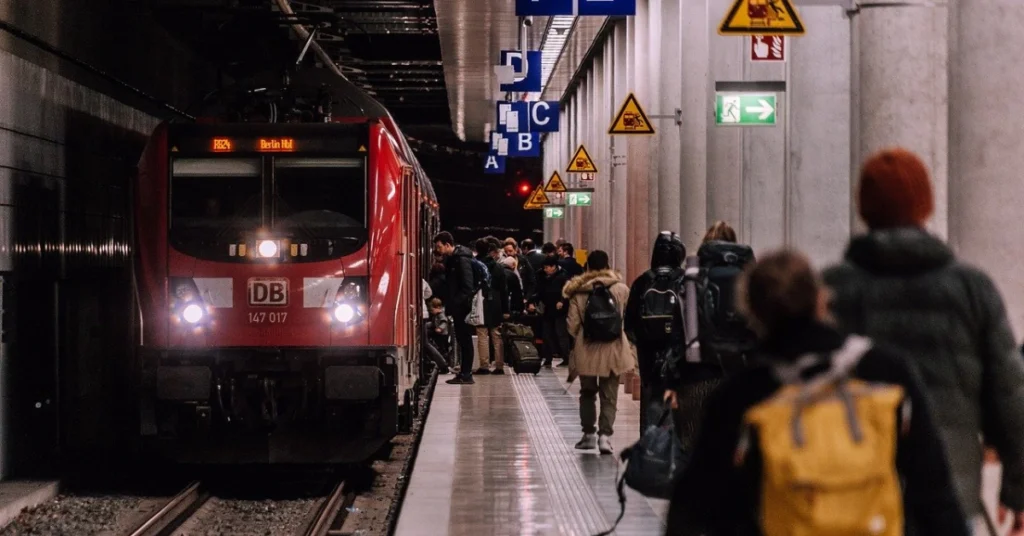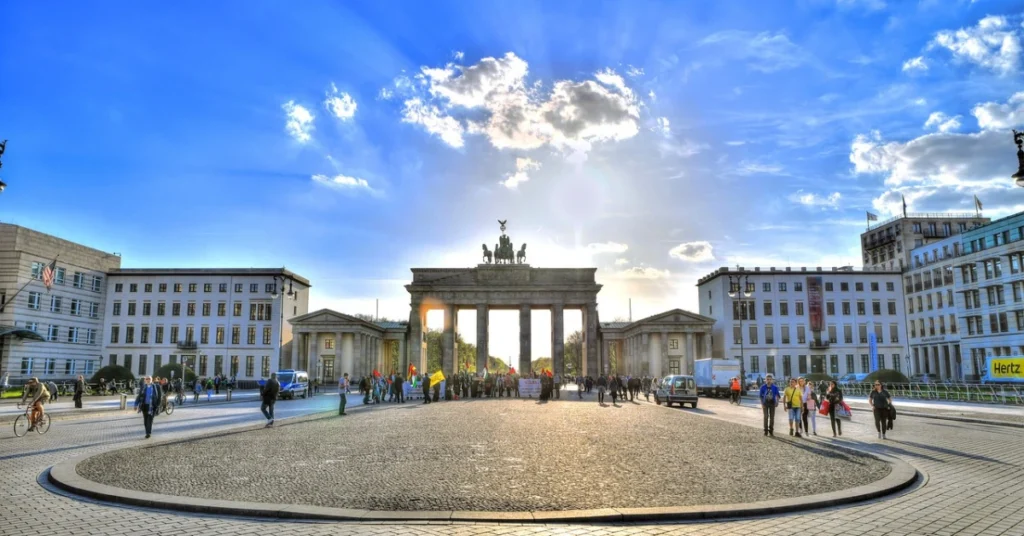Are you from Australia and considering relocating to Germany? Or have you already relocated and are in search of guidance on adapting to a new country? Being an Australian in Germany, you might encounter some hurdles, however, it also opens the door to embracing a different culture, connecting with new individuals, and discovering new locales.
Germany is a popular destination for Australians, with many choosing to study, work, or live there. According to The Local, there are around 13,500 Australians living in Germany. While this number may seem small compared to other nationalities, it’s still a significant community, and there are many resources available to help you settle in.
Whether you’re interested in learning about the local culture, finding a job, or navigating the visa process, there are plenty of resources available to help you. From the Australian Embassy in Berlin to expat groups like InterNations, you’ll find a wealth of information and support to help you make the most of your time as an Australian in Germany.
Getting Started
Congratulations on your decision to move to Germany as an Australian! This is an exciting adventure, but it can also be a bit intimidating. In this section, we’ll cover some of the basics to help you get started.
Visa and Entry Requirements
As an Australian citizen, you can visit Germany for up to 90 days without a visa. However, if you plan to stay longer, you’ll need to apply for a visa. The type of visa you need will depend on your reason for staying in Germany. For example, if you’re going to work, you’ll need a work visa. If you’re going to study, you’ll need a student visa.
To apply for a visa, you’ll need to visit the German embassy or consulate in Australia. You’ll need to provide a variety of documents, including your passport, proof of health insurance, and proof of financial means to support yourself during your stay in Germany. The process can take several weeks, so be sure to apply well in advance of your planned departure date.
Cultural Differences

Moving to a new country can be a culture shock, so it’s important to be prepared for some differences in German culture. For example, Germans tend to be more reserved than Australians, and it may take some time to make friends. Germans also value punctuality, so be sure to arrive on time for appointments and meetings.
Another difference you may notice is the food. German cuisine is known for its hearty meat dishes, sausages, and bread. If you’re a vegetarian or have dietary restrictions, you may need to do some research to find suitable options.
Overall, moving to Germany as an Australian can be a great experience. Just be sure to do your research and be prepared for some cultural differences. With a little bit of planning, you’ll be able to make the most of your time in Germany.
Accommodation
As an Australian in Germany, finding suitable accommodation can be a daunting task. However, with the right information, you can make the process easier and more manageable. In this section, we will explore the types of accommodations available and provide budgeting tips to help you find the right accommodation that meets your needs and budget.
Types of Accommodations Available

Germany offers a wide range of accommodation options, from apartments to shared flats, hostels, and hotels. Each option has its advantages and disadvantages, and your choice will depend on your budget and preferences.
Apartments are the most popular option for expats in Germany. They are available in various sizes and are suitable for individuals, couples, and families. They are generally more expensive than shared flats, but you get more privacy and independence.
Shared flats, also known as Wohngemeinschaften (WG), are another popular option. They are cheaper than apartments and are suitable for students and young professionals. In a shared flat, you will share the kitchen, bathroom, and living room with other people. This option is perfect if you want to socialize and meet new people.
Hostels are ideal for short-term stays. They are cheaper than hotels and offer basic amenities such as a bed, bathroom, and kitchen. Hostels are perfect for backpackers and travelers on a budget.
Hotels are the most expensive option but offer more comfort and luxury. They are suitable for business travelers and tourists who want to enjoy their stay in Germany.
Budgeting Tips

Accommodation can be expensive in Germany, especially in major cities such as Berlin, Munich, and Frankfurt. However, with the right budgeting tips, you can find affordable accommodation that meets your needs.
Here are some budgeting tips to help you find affordable accommodation in Germany:
- Research: Do your research and compare prices before choosing an accommodation option. Check online reviews and ratings to ensure that the accommodation meets your expectations.
- Location: Choose an accommodation option that is close to your workplace or university. This will save you time and money on transportation.
- Roommates: Consider sharing an apartment or a flat with other people. This will help you save money on rent and other expenses.
- Negotiate: Negotiate the rent with your landlord or flatmates. You can save money by negotiating a lower rent or sharing expenses such as utilities.
Transportation
As an Australian in Germany, you have various options for transportation. Germany has a well-connected public transportation system that includes buses, trains, and trams. You can also rent a car if you prefer to explore the country on your own.
Navigating German Public Transportation

Public transportation in Germany is highly efficient and reliable. You can use the same ticket for all modes of transportation, including buses, trams, and trains. You can purchase a ticket at the station or from the bus driver. It’s important to note that you need to validate your ticket before boarding the train or tram. Failure to do so can result in a fine.
The German rail network is extensive and covers most parts of the country. You can travel to major cities like Berlin, Munich, and Frankfurt with ease. The high-speed trains are comfortable and offer a great way to see the countryside. If you plan to travel frequently, you can purchase a monthly or yearly pass to save money. Actually, there is the so-called “Deutschlandticket”, where you have to pay 49 Euro for one Month and you can use the ticket for all local Train lines.
Renting a Car
If you want to explore Germany at your own pace, renting a car is a great option. You can rent a car from major rental companies like Hertz, Europcar, and Avis. The German rental Car company Sixt is also very well known in Germany. You need to be at least 18 years old and have a valid driver’s license to rent a car in Germany. If you have an Australian driver’s license, you can use it in Germany for up to six months. However, you need to have an official translation of your license or an International Driving Permit (IDP).
It’s important to note that driving in Germany can be challenging, especially in big cities. German drivers are known for their strict adherence to traffic rules, so make sure you know the rules of the road before driving. Also, be aware that some cities have low-emission zones where only vehicles with low emissions are allowed. Make sure you check the regulations before driving in these areas.
Australian Communities in Germany

If you are an Australian in Germany, you may find it comforting to know that there are many other Australians living in the country. While the Australian community in Germany is relatively small compared to other expat communities, there are still plenty of opportunities to connect with other Australians and build a support network.
Connecting with Other Australians
One way to connect with other Australians in Germany is through online communities. The Australian Embassy in Berlin has a Facebook page where Australians can connect with each other and stay up-to-date on news and events. There are also several Facebook groups dedicated to Australians living in Germany, such as “Australians in Berlin” and “Australians in Munich.”
In addition to online communities, there are also several Australian expat groups in Germany that organize events and activities. The Australian Business in Europe (ABIE) is a non-profit organization that promotes business and cultural ties between Australia and Europe. They have a chapter in Germany and organize regular events for members.
Another option is to connect with other Australians through sports clubs or other social clubs. The Australian Football League (AFL) has a team in Germany, and there are also several Australian-themed pubs and restaurants in major cities like Berlin and Munich where you can meet other Australians.
Healthcare

As an Australian in Germany, it’s important to understand the German healthcare system. The German healthcare system is based on four basic principles: compulsory insurance, solidarity principle, self-administration, and subsidiarity.
Understanding the German Healthcare System
Compulsory insurance means that everyone must have statutory health insurance (GKV) provided that their gross earnings are under a fixed limit (Versicherungspflichtgrenze). Approximately 86% of the population is enrolled in statutory health insurance, which provides inpatient, outpatient, mental health, and prescription drug coverage. Administration is handled by non-governmental insurers known as sickness funds.
The solidarity principle means that everyone pays into the system according to their ability to pay, and everyone receives the same level of care regardless of their income. This principle is what makes the German healthcare system one of the most equitable in the world.
Self-administration means that the system is run by the sickness funds themselves, rather than by the government. This gives the sickness funds a high degree of autonomy, which allows them to tailor their services to the needs of their members.
Subsidiarity means that decisions are made at the lowest possible level. This means that the sickness funds are responsible for providing healthcare services to their members, rather than the government. This allows for a high degree of flexibility and responsiveness to the needs of individual members.
In addition to the statutory health insurance system, there is also a private health insurance system in Germany. Private health insurance is available to those who earn above the income threshold for statutory health insurance, as well as to certain groups of people, such as civil servants and the self-employed.
Australian Culinary Delights in Germany
If you’re an Australian in Germany, you may be curious about where to find some of your favorite foods from back home. Luckily, there are a few places where you can locate Australian cuisine in Germany.
Locating Australian Cuisine
One popular spot to find Australian cuisine in Germany is at The Bird in Berlin. This restaurant serves up classic Australian dishes such as meat pies, sausage rolls, and vegemite on toast. They also have a wide selection of Australian beers and wines to choose from.
Another option is The Down Under Pub in Frankfurt. This pub offers a range of Australian and New Zealand dishes, including fish and chips, burgers, and pavlova for dessert. They also have a selection of Australian and New Zealand beers on tap.
If you’re looking for some Australian coffee, check out Coffee Fellows in Munich. This café serves up flat whites, long blacks, and other popular Australian coffee drinks. They also have a variety of sweet and savory treats to go along with your coffee.
Staying Safe and Healthy
As an Australian in Germany, it’s important to stay safe and healthy during your travels. Here are a few tips to help you stay on track. You can find some general Tips right here, because those tips are also for you as an Australian, as they are for anyone else.
Emergency Services and Contacts

In case of a medical emergency, dial 112 for an ambulance. For non-emergency medical assistance, you can visit a local pharmacy or “Apotheke” for advice. Pharmacies are usually open from 8:30 am to 6:30 pm on weekdays and from 8:30 am to 1:00 pm on Saturdays.
If you need to contact the police, dial 110. For other emergencies such as fire or gas leaks, dial 112. It’s important to keep these numbers handy in case of an emergency.
Health and Safety Tips
Germany is generally a safe country, but it’s always important to take precautions to ensure your safety. Here are a few tips to help you stay safe and healthy during your stay:
- Carry a copy of your passport and visa with you at all times, and keep the original documents in a safe place.
- Be aware of your surroundings, especially in crowded areas such as train stations and tourist attractions.
- Avoid carrying large amounts of cash and keep your valuables in a secure place.
- Use sunscreen and wear protective clothing to avoid sunburn, especially during the summer months.
- Stay hydrated by drinking plenty of water, especially during hot weather.
- If you have any medical conditions or allergies, carry your medication with you at all times.
- Follow all COVID-19 guidelines and restrictions as advised by the German government and health authorities.
By following these tips, you can stay safe and healthy during your time in Germany.
Exploring German Attractions
As an Australian in Germany, you have the opportunity to explore a wide range of attractions that are unique to this country. From stunning castles to breathtaking natural landscapes, Germany has something for everyone. Here are some must-visit places for Australians. You can also check out our articles about the best cities in Germany to visit or about the best places in south Germany.
Must-Visit Places for Australians
Berlin

Berlin is a city that is rich in history and culture. It is home to many world-famous landmarks, such as the Brandenburg Gate and the Berlin Wall. You can also explore the city’s many museums and galleries, such as the Museum Island, which houses some of the world’s most famous art collections.
Neuschwanstein Castle
Neuschwanstein Castle is one of Germany’s most famous castles. It is located in the Bavarian Alps and was built by King Ludwig II in the 19th century. The castle is known for its stunning architecture and beautiful surroundings.
The Rhine Valley
The Rhine Valley is a beautiful region that is known for its picturesque landscapes and charming towns. You can take a boat tour along the river and explore the many castles and vineyards that dot the landscape.
Black Forest National Park

The Black Forest National Park is a must-visit destination for nature lovers. It is home to some of Germany’s most beautiful forests, lakes, and waterfalls. You can go hiking, cycling, or horseback riding through the park and enjoy the stunning scenery.
Oktoberfest

Oktoberfest is one of Germany’s most famous festivals. It is held annually in Munich and is a celebration of beer, food, and German culture. You can enjoy traditional Bavarian food and beer, as well as live music and entertainment.
Germany is a country that is full of surprises. Whether you’re interested in history, culture, or nature, you’re sure to find something that appeals to you. So, pack your bags and get ready to explore all that Germany has to offer!
Our Opinion
So what remains for us to say? As you can see, Germany is simply worth a visit. As an Australian in Germany, however, there are a few things to bear in mind. In addition to the foreign currency, this is primarily the visa requirement to enter the EU. However, once you are here, you will certainly like it very much. As Australians, their western culture and way of life is very similar to that in Germany. We Germans are a sociable people who like to welcome tourists to our country. Don’t miss the chance to visit Germany.
FAQ about Australians in Germany
What visas do I need as an Australian for a stay in Germany?
Australian citizens need a visa for longer stays. The application is submitted to the German embassy or consulate. For short stays up to 90 days within 180 days, a visa is generally not required.
How do I find accommodations that fit my budget?
There are numerous accommodation options in Germany, from hostels to vacation rentals. Platforms like Airbnb and Booking.com offer a wide range of choices. Compare prices and read reviews to make the best decision.
Is there a community for Australians in Germany?
Yes, there are vibrant Australian communities in German cities. Join online expat groups and attend events for Australians. These not only provide social connections but also offer valuable advice and support for your German adventure.
Are you an Australian in Germany? Let us know by heading to the comments below. We are looking forward to hearing from you.






